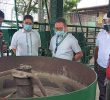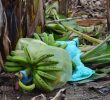By TYRONE A. VELEZ
DAVAO TODAY
DAVAO CITY – Mining groups and local government executives in Mindanao pressed anew on their bid to ensure that localities hosting mining operations would get their timely share of the mining proceeds to boost local development.
The 3rd Mindanao Mining Summit held here October 1 to 2 renewed the call after accounts from many local government units (LGUs) indicated that they still have to get their share from the mining proceeds due them a few years ago.
But an academic critic on foreign mining operations in the Philippines said that this call among local government executives and mining companies was not the “main issue in mining but the empowerment of communities”.
Vicente Lao, president of Alliance of Responsible Miners of Region (ARMOR) XI told Davao Today that the proposal would boost capacity of LGUs to undertake development projects “if they see taxes earned from mining is delivered immediately, instead of going through the long circuitous road waiting for two to three years”.
Under the Philippine Mining Act of 1995, LGUs would receive two percent excise tax from the gross revenue of a mining company in their locality.
Manuel Zamora, vice governor of Compostela Valley, attested to this claim saying that his province received only “a measly P3.9 million from excise tax remittances in the past five years, even as they host several mining explorations in almost all of its 11 towns”.
“Ganito kababa ang pera na natanggap namin (This is how measly the money we received),” he said during the Summit.
“Ang nagbabantay ng ating mina, ay LGU, you have to remember that. Ang nagbabantay ng gold ay ang communities, (The LGUs are watching over the mines. The communities are watching over the gold.) ” Zamora added.
The Mines and Geosciences Bureau in the region said the operation alone in Pantukan town of the National Development Corp., currently locked in a corporate war and with its supposed foreign partner, the US-based St. Augustine Gold and Copper Limited, was estimated to earn $2 billion once they start operation in 2017.
Zamora said that with gold deposits in Compostela Valley amounting to an estimated 36,328,699 metric tons, based on data from Mines and Geosciences Bureau (MGB), “the revenues could have provided a catalyst for downstream investments”.
He also said that the mandated LGU share was minimal but blamed Republic Act 7942, or the Philippine Mining Act and the Local Government Code, for limiting the provincial taxing powers that it could have derived from mining operations.
The province belongs to the so-called Eastern Mineral Belt, stretching from Davao Oriental to the Surigao provinces, all in the eastern coast of Mindanao.
According to government data, mining companies are charged two percent excise tax from their gross revenue and 40 percent of this excise tax is supposed to be remitted to the LGUs.
But groups, including those in the Ateneo de Davao University, said that revenue-sharing “is not the main issue but rather about empowerment of communities and local leaders”.
“The issue is not just about how much we earn. Rather, we should see how local government units are given power to decide to favor or oppose mining operations, to consider the interests and welfare of the community,” said Atty. Romeo Cabarde, Jr, director of Ateneo Public Interest on Legal Advocacy.
Cabarde said local officials have the option to oppose large-scale mining “as what the South Cotabato provincial government did with an environment code that prohibited the Xstrata-Sagittarius Mines to continue its mining operations in Tampakan”.
Cabarde said his group is supporting an alternative mining bill filed in Congress to replace the current Philippine Mining Act. The bill seeks to get the unanimous vote from local officials and communities to decide on mining operations, and to increase the percentage of excise tax and other taxes on mining corporations.
There are at least four bills pending in Congress seeking to replace or amend the Mining Act, but all failed to pass in the committee level in Congress, said Cabarde. He said this was due to the “numbers game, as several representatives have shares in mining companies”.
Cabarde said that of the 20 congressmen supporting the alternative bill, “not a single one comes from the Davao Region”.
Atty. Mussolini Lidasan, executive director of Al Qalam Institute for Islamic Studies, attended the summit but described the proposals as “icing on a problematic issue.”
“Before we talk of revenue-sharing, we should talk about the impact of mining. Where do we see Compostela Valley five to ten years from now? How much of the province’s agriculture and ancestral domain remain at that time?,” Lidasan said.
“Let’s support groups instead that move towards development, not just for corporations, but for the community,” Lidasan added.
The mining summit also came up with an action agenda supporting the call of the Chamber of Mines in the Philippines “to retain the 40% LGU share in excise taxes to facilitate timely utilization of funds for the mining community”.
The other proposals called on government agencies “to harmonize policies to resolve overlapping tenurial instruments in areas covered by tenements” and for the Department of Environment and Natural Resources and Department of Interior and Local Government “to take the lead to rationalize for consistency in certain provisions of the Mining Act and Local Government Code.”
Lao said the petition was signed by participants and delivered to the national government.
Meanwhile, Lao told Davao Today that the mining industry was already taking “mitigating measures to lessen the impact of mining to the environment” and said mining companies have re-planted 10,000 hectares of trees nationwide.
Mining operations were blamed for the landslides and deaths in the aftermath of Typhoon Pablo last December that left 1,146 dead, 834 missing and nearly 200,000 homes damaged mostly in Compostela Valley. (Tyrone A. Velez, davaotoday.com)
ateneo de davao university, Mining in Compostela Valley, Mining in Mindanao, Vicente Lao, Way Kurat Zamora









